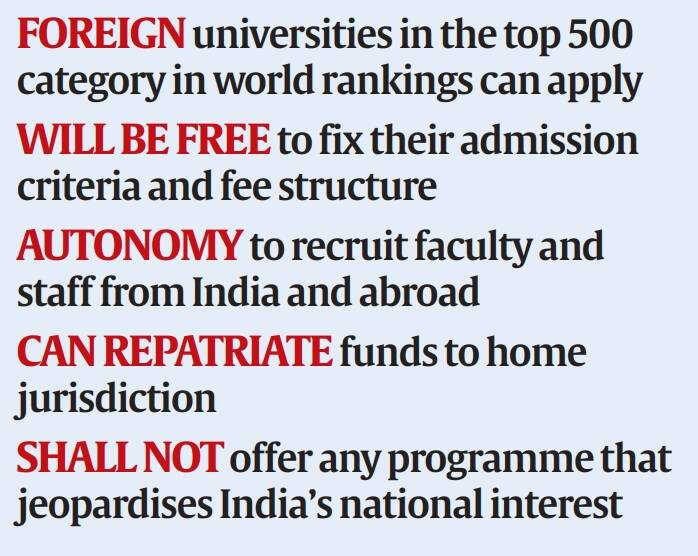Governance
Draft Norms Announced by UGC for Foreign Universities
- 10 Jan 2023
- 7 min read
Prelims: UGC, NEP 2020.
Mains: Draft Norms announced by UGC for Foreign Universities and its Significance.
Why in News?
The University Grants Commission (UGC) has announced draft norms for facilitating foreign universities and educational institutions to set up campuses in India which allow them autonomy in decision making.
What are the Draft Norms Announced by the UGC?
- Sets Criteria:
- A foreign university with a rank among the top 500 global rankings or a foreign educational institution of repute in home jurisdiction can apply to the UGC to set up a campus in India.
- Application Process:
- The application will be considered by a standing committee appointed by the UGC which will submit its recommendations within 45 days after examining the institution’s credibility, programmes offered, their potential.
- Subsequently, within 45 days, the UGC may grant in-principal approval to the foreign institution to set up campuses in India within two years.
- The initial approval will be for 10 years, which can be extended.
- Mode of Teaching:
- It will also have autonomy to recruit faculty and staff from India and abroad.
- The courses to be offered cannot be in online and open and distance learning mode.
- The qualifications awarded to the students in the Indian campus should have equivalence with those awarded by the institutions in their country of origin.
- Such universities and colleges cannot offer any such programme of study which jeopardises the national interest of India or the standards of higher education in India.
- Fund Management:
- Foreign universities will be allowed to repatriate funds to parent campuses.
- Cross-border movement of funds and maintenance of Foreign Currency Accounts, mode of payments, remittance, repatriation, and sale of proceeds, if any, will be as per the Foreign Exchange Management Act (FEMA) 1999 and its Rules.
- It will also have the autonomy to decide its fee structure, and will face no caps that are imposed on Indian institutions. The fee should be “reasonable and transparent.
What is the Significance of the Move?
- Nearly 13 lakh students were studying abroad in 2022 according to the Ministry of External Affairs data; and as per the RBI, Rs 5 billion was lost in foreign exchange due to students going overseas in FY 2021-2022
- Allowing foreign universities to set-up campuses in India will also ensure that all our students — there are around 40 million pursuing higher education — have access to global quality education.
- The ideal of setting up foreign universities’ campuses in India is also mentioned in the National Education Policy (NEP) 2020.
- The NEP says that the top 100 universities in the world will be facilitated to operate in India through a legislative framework.
- In a way, the draft regulations released only seek to institutionalize the NEP’s vision.
- This move will pave the way for India to become a global destination for education.
- It will not only help prevent brain drain and loss of forex due to Indian students studying overseas, but also help to attract overseas students to India.
- It will encourage competition among various players in the country, and allow faculty to faculty research collaboration among various universities.
- After Chinese students, Indians are the largest category of foreign students in countries like the U.S., the U.K. and Australia.
What are the Concerns?
- It is believed that the social justice concerns have been ignored which is very important in our context where higher education is very effective means for social change.
- Draft regulations have no provisions for caste-based/economic-based/minority-based/armed forces-based/Divyang-based/Kashmiri migrants/representation-based/women reservation in student admissions.
- Section of educational practitioners has expressed reservations about allowing international universities to operate in India as it would raise the cost of education, rendering it out of reach for a large part of the population.
- Repatriation of funds to the parent institution abroad, which was prohibited previously, has also been allowed.
- There’s also no requirement for foreign education providers to maintain a corpus fund to operate in India.
Way Forward
- If the Indian higher education sector truly opens up, it will be one step forward in India’s aspiration to become a knowledge society again, if not actually a Vishwa-guru.
- Not protectionism and shuttering our intellectual borders, but competition and collaboration with the best will help usher in a true Indian renaissance.
UPSC Civil Services Examination, Previous Year Question (PYQ)
Prelims
Q. Which of the following provisions of the Constitution does India have a bearing on Education? (2012)
- Directive Principles of State Policy
- Rural and Urban Local Bodies
- Fifth Schedule
- Sixth Schedule
- Seventh Schedule
Select the correct answer using the codes given below:
(a) 1 and 2 only
(b) 3, 4 and 5 only
(c) 1, 2 and 5 only
(d) 1, 2, 3, 4 and 5
Ans- (d)
Mains
Q1. How have digital initiatives in India contributed to the functioning of the education system in the country? Elaborate on your answer. (2020)
Q2. Discuss the main objectives of Population Education and point out the measures to achieve them in India in detail. (2021)





